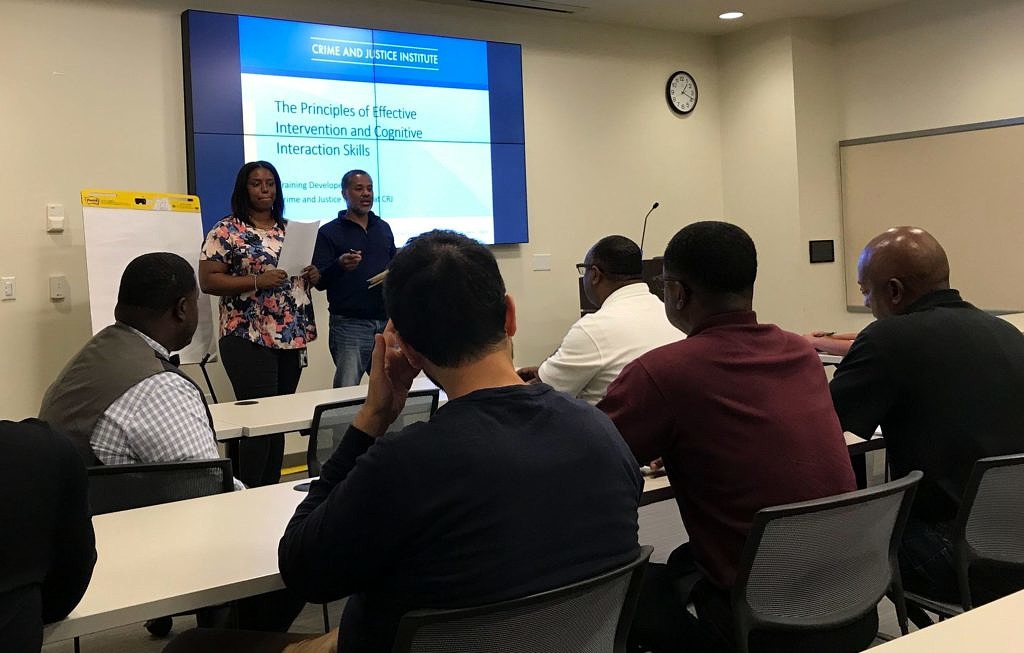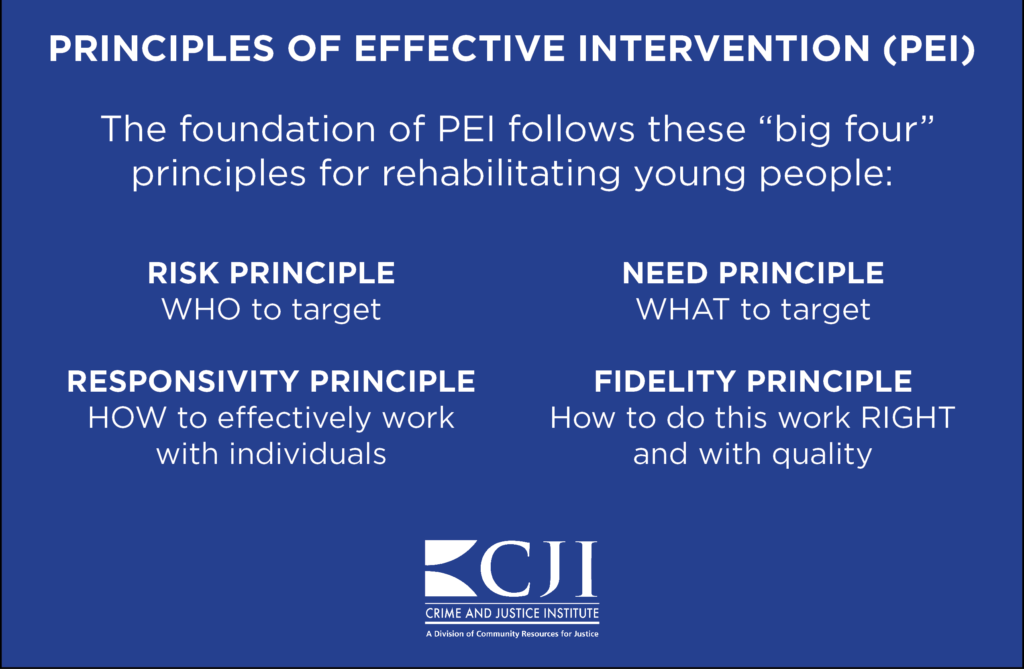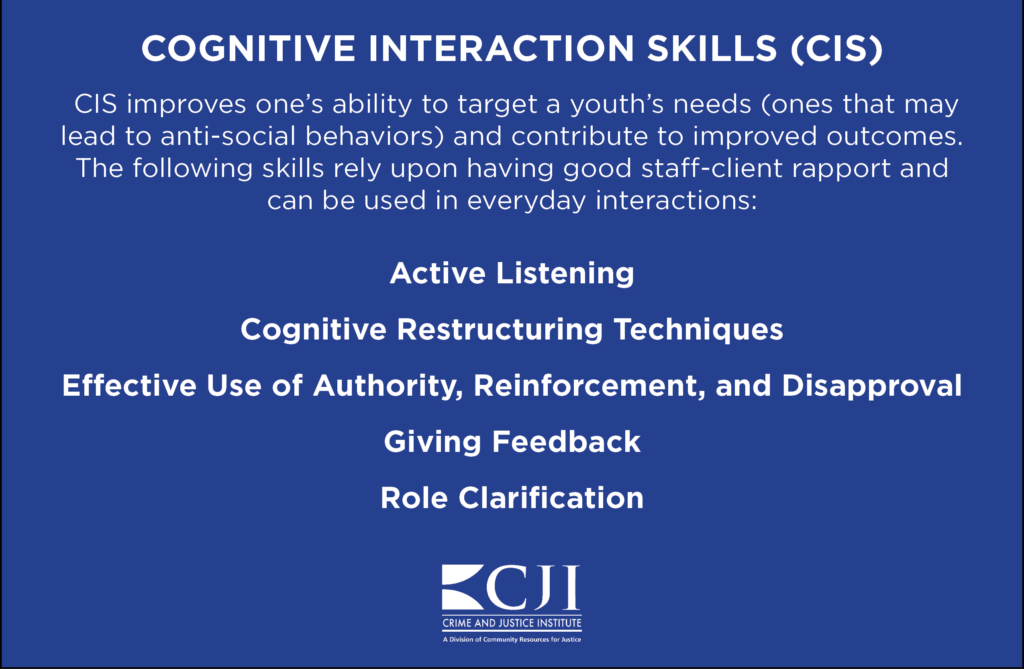
Davidson County’s Juvenile Court (DCJC) is in the midst of an exciting transformation, as they incorporate best practices into all aspects of their court system and include staff at every level.
Following the passage of Tennessee’s Juvenile Justice Reform Act of 2018, DCJC leaders shifted their focus to implementing evidence-based practices proven to reduce recidivism. They knew they would need certain components to succeed: collaboration (especially interagency), a shared message across the court for every interaction with young people and their families, and a plan for sustainability.
As a part of the initial effort, DCJC’s Judge Sheila Calloway and Kathy Sinback, DCJC court administrator, knew staff would benefit from hands-on tools to put knowledge into practice. With that in mind, they called upon CJI, an organization already providing juvenile justice technical assistance to Tennessee through the Office of Juvenile Justice and Delinquency Prevention’s Juvenile Justice System Improvement initiative. They specifically requested that CJI deliver trainings on the Principles of Effective Intervention (PEI) and Cognitive Interaction Skills (CIS) for the entire probation unit. Additionally, DCJC chose eight staff, including the Chief of Probation, to become certified trainers. The trained staff began seamlessly weaving their new skills and knowledge into their work and DCJC now offers these trainings as part of their onboarding process and as needed.

Learn more about CJI’s training, including PEI and CIS.
“When we understand the importance of specifying the right treatment and the right resources for the ‘right’ children, we can be of greater service to the entire community,” said Judge Calloway. “In the past, we sometimes over-serviced youth and we unknowingly put them at a greater risk to return to the system. Now, we can maximize our impact by concentrating efforts on the young people who truly need us and by intervening in ways that help strengthen families and our communities.”
The training helped fill a gap for DCJC staff from prior trainings and discussions, especially by providing an effective way to interact with youth, families, colleagues, and providers in a meaningful way. DCJC colleagues learned skills and a framework for talking about issues with each other—ideally, they can now talk about cases more quickly and concisely—and the shared knowledge now holds everyone more accountable as they work with young people moving through the system. Everyday interactions will now decrease the risk of young people on their caseloads getting involved in crime, while also building a better sense of partnership with all staff.
Knowing it was pivotal that this effort be collaborative, DCJC Magistrate Alan Calhoun sought out becoming a trainer so he could share an understanding of the new evidence-based practices and skills for interactions with youth throughout the court process. And so he could continue to share that knowledge down the road.
“Our court is trying to structure how we make decisions a little differently,” Magistrate Calhoun said. “As a judge, I want to know and understand what probation staff are doing, what they succeed with, and what they attempted doing when working with a young person. That knowledge will better inform the decisions I make on a daily basis.”
Magistrate Calhoun is the first juvenile court magistrate CJI prepared as a trainer in the time CJI has been providing technical assistance to states; CJI has delivered juvenile justice technical assistance to more than 10 states, including 20 train-the-trainer sessions.
Since Magistrate Calhoun could now lead trainings, he co-led an additional training with CJI for the county’s juvenile court judge, magistrates, district attorney’s office, public defender’s office, and court administrator. This combination of key stakeholders learning together is valuable and unique for a court system; these stakeholders hold a considerable amount of decision-making power and authority, yet often are stuck in their own siloes. It’s clear DCJC truly wanted to make a positive impact and ensure all key stakeholders were willing to learn something new, together, to positively affect contact with youth and families.
The trainings offered an understanding of how evidence-based principles can positively affect young people and families in Tennessee who encounter the DCJC system. The CIS training specifically gets at the core of how adult decisions affect children and families.
“Young people and families will now have consistency in what they experience and what they can expect,” Sinback said. “We’ll be a better-informed team of supportive adults, consistent in how we build positive behaviors and how we message and address challenges and growth with anyone we interact with.”
Another takeaway for the court staff was how to set expectations in a way that does not hold actions over a young person’s head for longer than necessary.
“Judges need to learn the power of their communication styles and how they can be firm and effective and help hold people accountable in a positive way,” Judge Calloway added. “The power of the bench and the robe is very strong, especially on children and families in crisis situations. The court scenario can either traumatize someone or be a positive force for good. We want it to be the latter.”

DCJC’s main goal as they continue to rework parts of the court system is to decrease unnecessary court contact for low-risk youth by improving evidence-based practices, while simultaneously improving services for moderate- and high-risk youth. These trainings serve as a great launchpad and CJI looks forward to continuing to support county leaders as needed as their implementation plan continues to move ahead.
LEARN MORE about how CJI provides technical assistance to state and local governments interested in using a data-driven approach to design, enact, and implement system-level reforms to juvenile system systems.